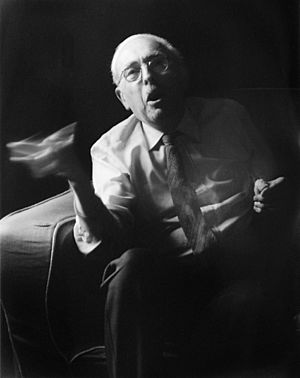Magnus Pyke facts for kids
Quick facts for kids
Magnus Pyke
OBE FRSE FRIC
|
|
|---|---|

Pyke at home in 1987
|
|
| Born |
Magnus Alfred Pyke
29 December 1908 Paddington, London, England
|
| Died | 19 October 1992 (aged 83) Wandsworth, London, England
|
| Nationality | British |
| Alma mater | McGill University, Montreal University College London |
| Spouse(s) |
Dorothea Vaughan
(m. 1937; |
| Children | 2 |
| Scientific career | |
| Fields | Nutritionist |
Magnus Alfred Pyke (29 December 1908 – 19 October 1992) was a famous British scientist. He was a nutritionist, which means he studied food and how it helps our bodies. He also worked for the government, wrote many books, and became a well-known TV and radio personality. You might even recognize his voice from the 1982 song "She Blinded Me with Science" by Thomas Dolby!
Contents
Early Life and Education
Magnus Pyke was born in London, England, in 1908. He went to St. Paul's School in London. After a short time working for an insurance company, he moved to Canada.
In Canada, he studied agriculture at McGill University in Montreal. He earned his science degree in 1933. During his summer breaks, he worked as a farm helper. He lived in Canada for seven years.
He returned to the UK in 1934. He became the chief chemist at a company called Vitamins Ltd. He worked with Professor J.C. Drummond to research vitamins. In 1936, he earned his Ph.D. in biochemistry. In 1937, he married Dorothea Mina Vaughan, and they had two children.
Helping During Wartime
In 1941, during World War II, Pyke joined the Ministry of Food. He and Professor Drummond studied how food shortages affected people's nutrition. He gave talks about healthy eating for people who provided food in schools and hospitals.
These talks were later published as a book called The Manual of Nutrition. He also supported using rose hip syrup. This helped replace orange juice, which was hard to get during the war. After the war, he advised the Allied Commission for Austria. He continued to work on healthy diets and teaching about nutrition.
Later Scientific Work
In 1949, Magnus Pyke joined The Distillers Company. He worked in their yeast research division. He became the manager of this division in 1955 and retired in 1973.
Pyke was very active in promoting science. He was the chairman of the Nutrition Society (Scotland) and a member of many other scientific groups. He became a Fellow of the Royal Society of Edinburgh in 1956. He also became chairman of the British Science Association in 1973. He believed that food companies helped society. He often defended them when people said their products were unhealthy.
Becoming a TV Star
Magnus Pyke started broadcasting on BBC radio in 1953. He gave talks about science and technology. In 1974, he appeared on a TV show called Don't Ask Me. On this show, he and other experts answered popular science questions.
He became famous for his energetic way of speaking. He used lots of hand gestures and was very passionate. He also appeared on popular radio shows like Any Questions? and Just a Minute. He even appeared on Desert Island Discs. He called this time his "sixth life."
In 1975, a science magazine asked readers to name the most famous scientist. Pyke came third, after Isaac Newton and Albert Einstein! He also won awards for his TV work.
TV Appearances
- The Fifty-One Society (1960)
- A Suspicion of Poison (1962)
- Can Man Be Modified? (1965)
- The Eamonn Andrews Show (1966)
- Parkinson (1971)
- Don't Ask Me (1974–75)
- This is Your Life (1975)
- Whodunnit? (1975–1978)
- Celebrity Squares (1976)
- The Big Time (1976)
- For Schools, Colleges: Biology: The Energy Chain (1976)
- It's Patently Obvious (1976–1989)
- The Bob Braun Show (1977)
- M'Lords...Ladies and Gentlemen (1978)
- Larry Grayson's Generation Game, untransmitted pilot (1978)
- 3-2-1 (1978–1980)
- Lenny and Jerry's Holiday Special (1978)
- Jim'll Fix It (1978)
- Multi-Coloured Swap Shop (1978)
- It's a Celebrity Knockout (1978–1980)
- For Schools, Colleges: Design by Five 1: "A Kitchen for Magnus Pyke, designed by John Wealleans" (1979)
- Lenny and Jerry (1979)
- The Lenny and Jerry Show (1979)
- The Basil Brush Show (1979)
- Star Games (1979)
- Watch this Space (as "Skwirt") (1980)
- Does the Team Think? (1982)
- Q.E.D. (1982)
- 16 Up: How Do I Look? (1982)
- On Safari (1982)
- "She Blinded Me with Science" (1982) (as The Doctor, in the popular music video and song by Thomas Dolby)
- Windmill (1985–86)
- Through the Keyhole (1987)
- Scoff (1988)
Awards and Recognition
Magnus Pyke received special honorary degrees from several universities. These included the University of Stirling (1974), Lancaster University (1976), and his old university, McGill University (1981). In 1978, he was given the title of Officer of the Order of the British Empire (OBE). This is a special award from the British government.
Later Life
Pyke stopped regular broadcasting in 1980, though he still made occasional TV appearances. He cared for his wife at home until she passed away in 1986. Magnus Pyke died on 19 October 1992, in London.
See also
- Geoffrey Pyke (his first cousin)
 | Kyle Baker |
 | Joseph Yoakum |
 | Laura Wheeler Waring |
 | Henry Ossawa Tanner |

